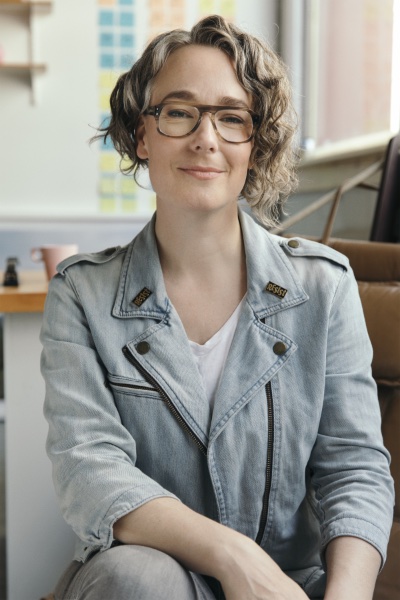4 Questions: Stéphanie Verge
This article is part of our series 50 Years of Disruption, in celebration of the Department of Theatre’s 50th Anniversary. In it, we’ll ask each participant four questions about themselves and their time at York.

1. Who are you?
The short version: Stéphanie Verge (B.A. Playwriting and New Play Dramaturgy, 2000) is an editor, journalist and writer based in Montréal.
There’s a bit more to it, of course. Currently, I am the co-editor-in-chief of LSTW, a bilingual magazine for queer women distributed in 10 countries, and the executive editor of the Canadian edition of Reader’s Digest. I spend my time assigning stories, doing research, working with writers, and editing copy.
Previously, I was an associate editor at Toronto Life, where I spearheaded the creation of the magazine’s Culture section, covered the Toronto International Film Festival, and won a National Magazine Award for my health feature about infectious diseases in Ontario hospitals.
As a freelancer, I have co-authored The Bar Chef: A Modern Approach to Cocktails (HarperCollins); done copy writing for the Corporation of Massey Hall and Roy Thomson Hall in Toronto, and the National Music Centre in Calgary; and been published by the Globe and Mail, CBC Arts, Flare, enRoute and The Grid, among others. My culture-related interviews have focused largely on artists whose work deals with feminist issues. Some of my favourites: writers Alison Bechdel and Fran Lebowitz; contemporary artists Marina Abramović and Laurie Anderson; comedians Samantha Bee and Sandra Bernhard; musicians Tegan and Sara Quin; and filmmaker Deepa Mehta.
In my free time, I volunteer as a workshop leader for GRIS-Montréal, an organization that goes into schools and seniors’ residences to demystify LGBTQ+ realities; and as a “little sister” with Les Petits Frères, a non-profit that aims to reduce social isolation and loneliness in seniors.
I can say with confidence that my theatre training and my journalism training inform both my professional and volunteer lives on a daily basis.
2. What was your favourite moment during your time in the Theatre Department, and why?
I had many favourite moments—my four years at York changed the course of my life. But I do look back on first-year crew as a particularly wonderful experience. Going to classes all day and then working on shows at night was exhausting but impossibly fun. It’s rare that you get the chance to immerse yourself in so many aspects of a craft in such a short period. While I learned that I have very little skill for anything beyond writing, I had a great time figuring that out.
3. What comment, quotation, statement, or action that a professor—or classmate—offered had the greatest impact on you?
In one of my third-year directing classes, we had to put on a one-person show. At one point during my performance, I got choked up and barely made it through. Our instructor, Paul Lampert, later told me—I’m paraphrasing—that while it’s important to bring emotion to a performance, you can’t let it get away from you. Over the years, I have used variations on that piece of advice with writers (and with myself).
4. Is there a way you incorporate a particular aspect of your theatre training in your current work?
These days, I work with non-fiction writers rather than playwrights, but their needs are similar. I offer constructive feedback, assist with editing, research and fact-checking, and act as a sounding board, coach and cheerleader. All to say, my playwriting and new play dramaturgy training under Judith Rudakoff serves me each day.
I use principles picked up in acting classes each time I appear on TV and radio, participate in a panel discussion, or lead a workshop. I thank York for enabling me to trick people into believing I’m not nervous about public speaking!
